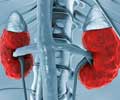Coordination of care to slow kidney disease progression is likely to be cost effective because it prevents the need for dialysis.

Kidney failure, or end-stage renal disease (ESRD), accounts for 5.6% of total Medicare expenditures, though ESRD patients on dialysis make up only 1.6% of its beneficiaries. Multi-disciplinary care--or coordination of care among different clinicians and specialists--has been proposed as a way to benefit patients while reducing costs as they progress from chronic kidney disease (CKD) to ESRD.
‘Multi-disciplinary care or coordination of care among different clinicians and specialists improves the health of patients with kidney disease.’





To evaluate this approach, Eugene Lin, MD (Stanford University) and his colleagues developed a model related to the progression from CKD to ESRD that takes into account different patient characteristics.The team found that multi-disciplinary care in patients with CKD is a relatively inexpensive intervention, costing only $24,613 per quality-adjusted life year (QALY). (One QALY equates to 1 year in perfect health.) In contrast, a recent analysis found that dialysis costs $129,090 per QALY. "Even if the multi-disciplinary care program were deployed inefficiently, it would be significantly cheaper than other interventions, largely because it alleviates the much larger cost of dialysis," said Dr. Lin. Medicare coverage of multi-disciplinary care would be a relatively low-cost way to improve the health of patients with kidney disease.
"Our research suggests that strategies aimed at slowing the progression of kidney disease are likely to be cost effective because they prevent the need for dialysis, a very expensive therapy."
Source-Eurekalert















